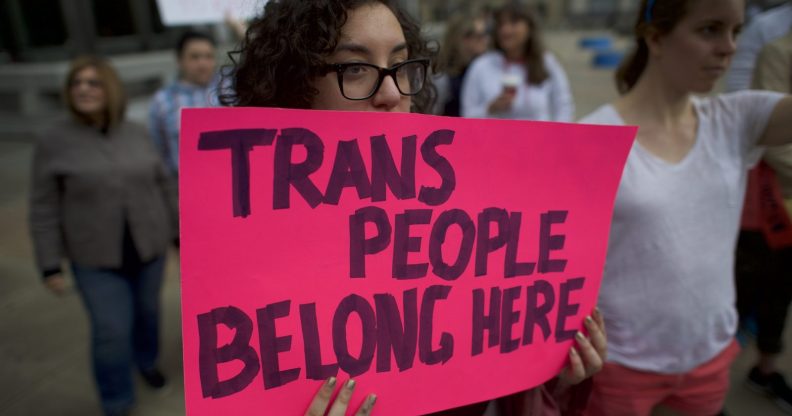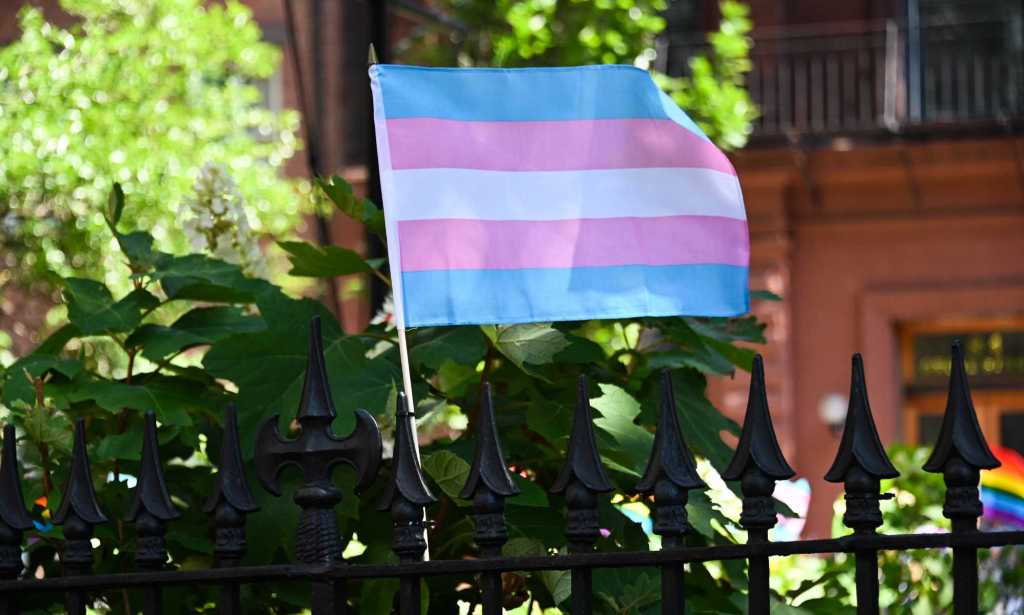Shemale: Why you should never use this word to describe trans women

Protestors during a rally against the trans bathroom bill in Philadelphia, 2017. (Mark Makela/Getty Images)
The derogatory term “shemale” has been used to refer to trans women, especially those in the sex industry.
Today, the insult is widely regarded as disrespectful and offensive to trans women because it denies their gender identity.
The transphobic slur specifically refers to trans women with male genitals and female secondary sex characteristics, such as breasts from breast enlargement surgery or using hormones.
And, despite the hurt the word causes, the usage of “shemale” has continued.
Just last October, a sociology professor David Sorbello was called out for making his students play a game called “female or shemale?” during a class on gender, sexuality and sexual identity at State University of New York at Geneseo.
The quiz featured headshots of cisgender women next to transgender women, and asked participants to work out which was which.
Related: University professor makes students play ‘Female or Shemale?’
And, in 2015, RuPaul’s Drag Race axed its catchphrase “you’ve got she-mail” after a row over transgender slurs.
The show had previously come under fire in 2014 for a segment in which contestants were asked to guess from a photo whether someone was a ‘female or she-male’. The company behind the series, Logo TV, later pulled the segment from all future broadcasts.
It’s important, then, to address why we shouldn’t use this slur, and why we should challenge those who do.
“Shemale” is offensive and degrading
The “shemale” slur is regarded as degrading by the trans community because it denies the gender identity of trans women.
As Natacha Kennedy, an activist and trans woman, says: “I don’t know any trans woman who uses this term to describe herself, every trans woman I know describes herself as a woman.
“This is important because one of the few things all trans people have in common is the way we have had our identities coercively assigned… from birth.”
Kennedy adds, by asserting a different gender identity, the word shemale is insulting to trans women.
“So attempting to coercively apply yet another identity descriptor like this for trans people can only be regarded as abusive in the extreme,” she continues.
“Anyone attempting to justify its coercive use can therefore only be regarded as vindictively attempting to condone offensive, malicious and profoundly disrespectful behaviour.”
Related: Channel 4 say they are ‘right’ to broadcast ‘tranny catfish’ slurs on First Dates
The importance of language
The slur “shemale” also feeds into the wider transphobic dialogue, which has been used to marginalize and abuse trans people for many years.
As Bex Stinson, head of trans inclusion at Stonewall, tells PinkNews: “Language is important and it’s especially important when describing or referencing someone’s identity.
“The term ‘shemale’ is often used in a derogatory way and is widely condemned by the trans community as highly offensive.”
Likewise, Lui Asquith, vice chair of Amnesty International UK’s LGBTI Network, says: “Similar to other slurs, ‘she-male’ is a term used to humiliate and degrade the trans community – specifically here, the trans female community.
“Language has been used throughout history to marginalise, exclude and dominate in order to ensure a continuance of power.
“This is something we are becoming more conscious of, which is essential progress because the use of abusive language to exert power in this way must end.”
Asquith continues, arguing that transphobic words like “shemale” can even constitute a hate crime.
They add: “This term is both outdated – although it has never been morally in date – and abusive, and the use of such language could constitute a hate incident; namely verbal or online abuse.”
The usage of “shemale” in the sex industry
The origins of the use of “shemale” lie in the sex industry, where this slur has been used as the punch line in porn videos, alongside other offensive terms like “tranny”.
Daniela Petruzalek, an activist on trans issues, says: “The term shemale is a term coined by the sexual industry to profit on the social vulnerability of pre-op transgender women.
“The problem arises from the fact that transgender people are often disowned by their families and friends.”
Petruzalek argues that the word is used to brand “us as lower class citizens,” meaning that “we are seen mostly as sex workers – no matter what we really are.”
“The use of the term shemale and any of its correlates, [like] ladyboy, is, therefore, very harmful to the overall sense that society has of the transgender people,” Petruzalek adds.
Related: This transgender man ‘was refused service and called a f***ing tranny in a barber shop’
Calling people out for using “shemale”
Given the offence caused by using “shemale,” it’s important to challenge those using it.
As Asquith says: “We all should be taking responsibility, not only for the language we are using but also to ensure such slurs are not tolerated.
“We must stand against these transphobic labels, because to allow them to exist is to allow for the continuance of prejudice, discrimination and, ultimately, the violation of human rights.”

“Language in relation to trans people should be respectful, fuelled with dignity and it should be carved out by those who are represented by such language,” they say.
“We need to move away from these slurs to further the movement of trans freedom.
“You can help make that change by recognising that your language makes a difference. Stopping saying ‘shemale’, if you do, it’s a good first step; challenging others who say it is the second.”

